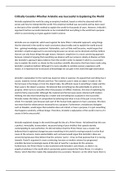Critically Consider Whether Aristotle was Successful in Explaining the World
Aristotle explained the world by using an empirical method, based on what he observed with his
senses and how he interpreted the world. This empirical method was successful and has been used
as the basis of the scientific method to explain the world for thousands of years. However, Aristotle’s
argument had less successful elements as he concluded that everything in the world had a purpose
which is unconvincing as it goes against modern science.
Aristotle was an empiricist, which went against his tutor Plato’s rationalist approach, using things
that he observed in the world to reach conclusions about reality and to explain the world around
him – gaining knowledge a posteriori. Rationalists, such as Plato and Descartes, would argue that
Aristotle’s empirical approach is unconvincing because our senses can be deceived and they believe
that we can only know things through reason. However, empiricism is a more convincing approach
because, instead of arguing that everything we observe with our senses is simply an illusion as Plato
did, Aristotle’s approach takes evidence from the world in order to explain it which is a successful
way to explain the world, as shown by the countless scientific discoveries that have been made using
Aristotle’s empirical method. Although it is more valuable to combine sensory experience with
reason, it is important not to discount all knowledge we can gain in this world through observation.
Aristotle’s explanation for the world was based on telos or purpose. He argued that everything has 4
causes: material, formal, efficient and final. The material cause is what an object is made of, the
formal cause is the design or form the object takes, the efficient cause it something’s maker and the
final cause is the object’s purpose. He believed that everything has the potentiality to achieve its
purpose, which turns to actuality when that purpose is fulfilled. However, this way of explaining the
world is fairly unsuccessful. Although the material and formal cause seem coherent with modern
thinking, the idea that everything has a maker and everything has a purpose is less successful.
Aristotle makes the fallacy of composition by believing that what is true of the part is true of the
whole. For example, just because each part of the human body appears to have a purpose, this does
not mean that the whole person necessarily has a purpose. Furthermore, evolutionary biologists
such as Dawkins, would argue that evolution does not intend, or have a purpose, it is just something
that happens randomly, without design. Therefore, Aristotle’s explanation of the world in terms of 4
causes is fairly unsuccessful.
Aristotle explained change in the world through his idea of a Prime Mover. He believed that this was
a perfect, immutable, transcendent, necessary being of pure intellect that spends eternity
contemplating its own perfection. He did not believe that the Prime Mover was a creator, but
believed that it explained change because everything in this world is moving towards it as the final
cause of the universe. Some existentialists such as Russel would argue that Aristotle’s ideas are
unconvincing because they believe that the universe ‘just is’, it has no final purpose that it is moving
towards. Russel’s argument is more convincing, because as modern science has progressed,
scientists become increasingly aware of the lack of need for a purpose for the universe.
Furthermore, the Prime Mover is also incoherent with Aristotle’s own theory, as there is no
empirical evidence in the world which conclusively points towards the Prime Mover, it is simple a
theory, which therefore makes this explanation less successful. However, on the other hand, there is





